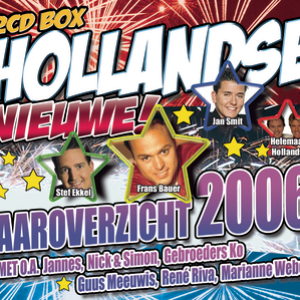In Ons Stamcafe
Marianne Weber Lyrics
Jump to: Overall Meaning ↴ Line by Line Meaning ↴
Waar een ieder behoefte aan heeft
Waar niemand zomaar op je neer kijkt
Als je een beetje gezelligheid geeft
Doordeweeks dan zit je gevangen
Al die dagen die haat ik het meest
En al die uren die lijken steeds langer
Maar op vrijdag begint weer het feest
Want in ons stamcafe
Trek ik weer even aan de bel
En voor de hele kroeg wat bier bestel
Dan gaan de remmen los
Ik hef het glas
En aan de zorgen denk ik morgen pas
Ik schuif weer aan bij de bar of een tafel
Plaats genoeg nou je komt er maar bij
Met een mop en voor ieder een drankje
Maak je zo weer wat vrienden erbij
Tis de kroeg waar mijn taal wordt gesproken
Geen dure woorden nee, doe maar normaal
De kastelein die niet kijkt als je weg gaat
Want hij weet dat ik morgen betaal
Want in ons stamcafe
Trek ik weer even aan de bel
En voor de hele kroeg wat bier bestel
Dan gaan de remmen los
Ik hef het glas
En aan de zorgen denk ik morgen pas
Want in ons stamcafe
Trek ik weer even aan de bel
En voor de hele kroeg wat bier bestel
Dan gaan de remmen los
Ik hef het glas
En aan de zorgen denk ik morgen pas
En aan de zorgen denk ik morgen pas
The song 'In Ons Stamcafe' by Marianne Weber is about a place where people can go to relax and be themselves. The singer talks about how during the week, she feels trapped and unhappy, but on Friday nights she goes to her stamcafe (regular pub) where she can let loose and forget about her troubles. She talks about the sense of camaraderie and belonging that she feels in the pub, where she can make new friends, tell jokes and enjoy a drink or two with the regulars. The lyrics convey a sense of nostalgia for the good times had in the pub and the feeling of being part of a community.
The song is very relatable, as many people can identify with the sentiment of needing a place to go and unwind after a long week. The stamcafe is painted as a warm and welcoming place, where even the kastelein (the bartender) doesn't judge you as long as you pay your bill. The lyrics also touch on the idea of Dutch gezelligheid, which roughly translates to a sense of coziness or conviviality, which is often associated with pubs and cafes in the Netherlands.
The song was released in 2007 as part of Weber's album 'Echte Liefde', which went on to win the Dutch Edison award for best album in the Folk category. Weber is known for her contributions to Dutch traditional music, often incorporating elements of German Schlager music into her songs.
Line by Line Meaning
Ik ken een plek waar je even jezelf bent
There's a place where you can just be yourself
Waar een ieder behoefte aan heeft
It's what everyone needs
Waar niemand zomaar op je neer kijkt
Nobody looks down on you
Als je een beetje gezelligheid geeft
If you provide a bit of cheer
Doordeweeks dan zit je gevangen
During the week you're trapped
Al die dagen die haat ik het meest
I hate all those days the most
En al die uren die lijken steeds langer
And all those hours just seem longer
Maar op vrijdag begint weer het feest
But come Friday the party starts again
Want in ons stamcafe
Because in our local pub
Trek ik weer even aan de bel
I ring the bell once more
En voor de hele kroeg wat bier bestel
And order beer for the whole pub
Dan gaan de remmen los
Then the brakes come off
Ik hef het glas
I raise my glass
En aan de zorgen denk ik morgen pas
And only think about my worries tomorrow
Ik schuif weer aan bij de bar of een tafel
I take a seat at the bar or a table
Plaats genoeg nou je komt er maar bij
There's plenty of room, come join us
Met een mop en voor ieder een drankje
With a joke and a drink for everyone
Maak je zo weer wat vrienden erbij
You can easily make some new friends
Tis de kroeg waar mijn taal wordt gesproken
It's the pub where my language is spoken
Geen dure woorden nee, doe maar normaal
No fancy words, just keep it simple
De kastelein die niet kijkt als je weg gaat
The landlord doesn't mind when you leave
Want hij weet dat ik morgen betaal
Because he knows I'll pay tomorrow
Contributed by Sebastian I. Suggest a correction in the comments below.
